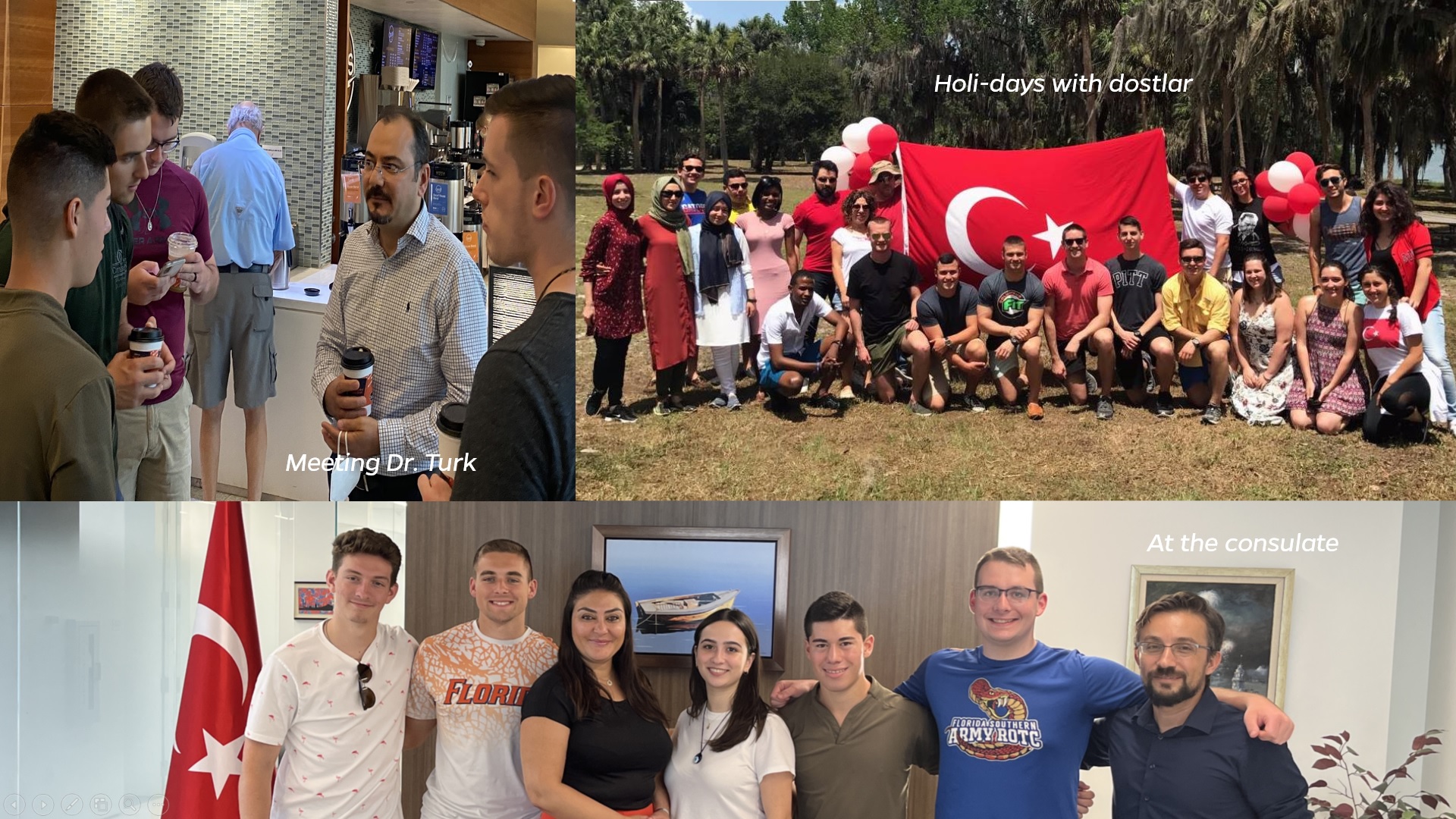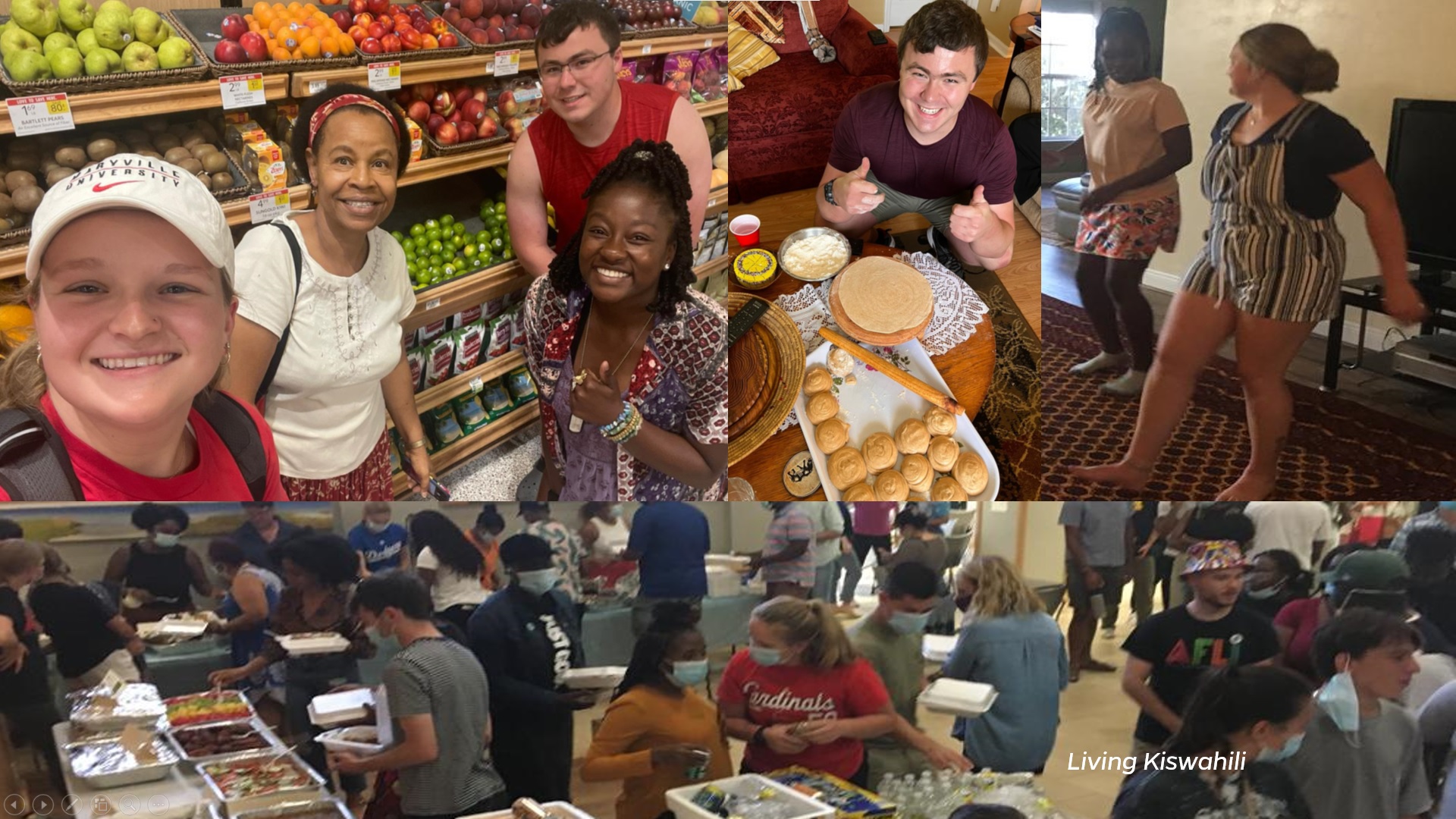Summer Program at UF
Dates: May 16 – July 11, 2024
Turkish Track
The rich history and culture of the Turkish world are of increasing interest to the English-speaking world. While progressing through the 21st century, Americans look for understanding of Turkey, which is a strategic NATO-member country connecting the United States and Europe to Central Asia and the Middle East. As Turkish language and cultures are the gateway into that understanding, students in our Turkish Track will gain the essential exposure and competence in relating to the Turkish world.

Courses
Beginning Turkish, 5 credits
Course Description and Objectives
Equivalent to the University of Florida’s first-year Turkish sequence, this intensive beginning course helps students develop listening, reading, speaking, and writing skills as well as explore local traditions and cultures. By the end of the course, students will be able to:
- Initiate and maintain face-to-face, virtual, and written conversations on familiar topics – such as family and self, business transactions, food, travel, health and accidents, music and sports,
- Recognize and execute grammar and basic vocabulary in conversing about the above topics in past, present, and continuous tenses,
- Develop an informed understanding of Turkey’s national, regional, and local customs and cultures, and,
- Eventually demonstrate “elementary proficiency” in Turkish (for more, see the description of Speaking 1 cited in Interagency Language Roundtable here).
A Course Designed for the Classroom & Beyond
This course offers an experiential learning experience to reach the objectives listed above. While in regular meetings, students will learn Turkish in its original context and apply it in real and simulated situations – such as creating e-portfolios, enacting children’s stories, and playing digital-dialects and other games. Besides classroom activities, students will be given an opportunity to:
- Pair with a native residential language partner with whom they will conduct real-life activities such as shopping in a super market and playing sports,
- Communicate with virtual language partners located in Ankara and Antalya, Turkey,
- Join weekly visits to Turkish professionals and families near campus, and,
- Experience field excursions for planned meetings communities in Gainesville but also other cities such as Tampa, Jacksonville, and Melbourne.
Contact hours: 15 classroom hours per week; 120 hrs in total
Additional hours: 10 weekly hours for homework; 5 weekly hours for interactive events (with residential and virtual partners/tutors, for movies and dinners with Turkish families in town); 3-day excursion to prominent “Turkish spaces” in Florida.
Intermediate Turkish, 5 credits
Course Description and Objectives
This intensive intermediate course is the equivalent of the University of Florida’s second-year Turkish language sequence. In this course, students will maintain and improve their four basic communicative skills (listening, reading, speaking, and writing) and develop a nuanced understanding of Turkish cultures. At the end of the course, students should expect to reach “basic working proficiency” (or Level 2 as described in Interagency Language Roundtable here). This proficiency allows them to:
- Initiate and execute everyday conservations on school, work, and other familiar topics with confidence,
- Engage in high-frequency conversational situations and exchange ideas and casual information,
- Develop a nuanced understanding of Turkey’s national, regional, and local cultures, and,
- Accomplish routine social demands and basic work requirements,
A Course Designed for the Classroom & Beyond
Like that of the beginner’s, this intermediate course will deliver an experiential learning experience to reach the objectives listed above. While in regular meetings, students will learn Turkish in its original context and apply it in real and simulated situations – such as communicating on Turkish social media, keeping a daily journal (diary), and playing Pictionary and authentic games. Besides classroom interactions, each student will be given an opportunity to:
- Pair with a native residential language partner with whom they will conduct real-life activities such as shopping in a super market and playing sports,
- Communicate with virtual language partners located in Ankara and Antalya, Turkey,
- Join weekly visits to Turkish professionals and families near campus, and,
- Experience field excursions for planned meetings communities in Gainesville but also other cities such as Tampa, Jacksonville, and Melbourne.
- Experience field excursions for planned meetings communities in Gainesville but also other cities such as Tampa, Jacksonville, and Melbourne.
Contact hours: 15 classroom hours per week; 120 hrs in total
Additional hours: 10 weekly hours for homework; 5 weekly hours for interactive events (with residential and virtual partners/tutors, for movies and dinners with Turkish families in town); 3-day excursion to prominent “Turkish spaces” in Florida.
Swahili Track

America has had a strong bilateral relationship with the countries of East Africa due to its strategic position on the continent, and ongoing wide-ranging cooperation on economic, regional and global security issues. Knowledge of the Swahili language, the Lingua Franca of East and Central Africa, and the cultures it represents is the key into understanding and strengthening this relationship. Students in our Swahili Track will gain the essential exposure, knowledge and competence in relating to the Swahili speaking people of East Africa.
Courses
Beginning Swahili, 5 credits
Course Description and Objectives
Equivalent to the University of Florida’s first-year Swahili sequence, this intensive beginning course helps students develop listening, reading, speaking, and writing skills as well as explore local traditions and cultures. By the end of the course, students will be able to:
- Initiate and maintain face-to-face, virtual, and written conversations on familiar topics – such as family and self, business transaction, food, travel, health and accidents, music and sports,
- Recognize and execute grammar and basic vocabulary in conversing on the above topics in past, present, and continuous tenses,
- Develop an informed understanding of the cultures and customs of East Africa, at the regional, national, and local levels, and,
- Eventually demonstrate “elementary proficiency” in Swahili in accordance to Interagency Language Roundtable (ILR).
A Course Designed for the Classroom & Beyond
This course offers an experiential learning experience to reach the objectives listed above. While in regular meetings, students will learn Swahili in its original context and apply it in real and simulated situations – such as creating e-portfolios, enacting children stories, and acting out role plays in skits and other games. Besides classroom activities, students will be given an opportunity to:
- Pair with a native residential language partner with whom they will conduct real-life activities such as shopping in a super market and playing sports,
- Communicate with virtual language partners located in Tanzania and Kenya,
- Join weekly visits to East African professionals and families near campus, and,
- Experience several field excursions for planned meetings in cities such as Tampa and Orlando, Florida.
Contact hours: 15 classroom hours per week; 120 hrs in total
Additional hours: 10 weekly hours for homework; 5 weekly hours for interactive events (with residential and virtual partners/tutors, for movies and dinners with East African families in town); 3-day excursion to prominent “Swahili spaces” in Florida.
Intermediate Swahili, 5 credits
Course Description and Objectives
This intensive intermediate course is the equivalent of the University of Florida’s second-year Swahili language sequence. In this course, students will maintain and improve their four basic communicative skills (listening, reading, speaking, and writing) and develop a nuanced understanding of Swahili cultures. At the end of the course, students should expect to reach “basic working proficiency” (or Level 2 as described in Interagency Language Roundtable (ILR)). This proficiency allows them to:
- Initiate and execute everyday conservations on school, work, and other familiar topics with confidence, /li>
- Engage in high-frequency conversational situations and exchange ideas and casual information,
- Develop a nuanced understanding of the cultures and customs of Swahili speakers of East Africa at the national, regional, and local levels, and,
- Accomplish routine social demands and basic work requirements.
A Course Designed for the Classroom & Beyond
Like that of the beginner’s, this intermediate course will deliver an experiential learning experience to reach the objectives listed above. While in regular meetings, students will learn Swahili in its original context using authentic materials and apply it in real and simulated situations – such as communicating on Swahili social media, keeping a daily journal (diary), and playing Pictionary and authentic games. Besides classroom interactions, each student will be given an opportunity to:
- Pair with a native residential language partner with whom they will conduct real-life activities such as shopping in a super market and playing sports,
- Communicate with virtual language partners located in Kenya and Tanzania,
- Join weekly visits to East African professionals and families near campus, and,
- Experience several field excursions for planned meetings in cities such as Orlando and Tampa.
Contact hours: 15 classroom hours per week; 120 hrs in total
Additional hours: 10 weekly hours for homework; 5 weekly hours for interactive events (with residential and virtual partners/tutors, for movies and dinners with Turkish families in town); 3-day excursion to prominent “Swahili spaces” in Florida.